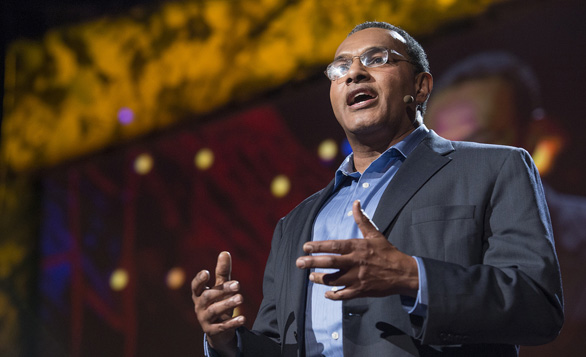
Photo: James Duncan Davidson
Freeman Hrabowski was a 9th grader in Birmingham, Alabama, when he heard a dynamic, impassioned speaker at church — Dr. Martin Luther King, Jr. At the time, King was organizing a march for children, and Hrabowski begged his parents to let him be a part of it.
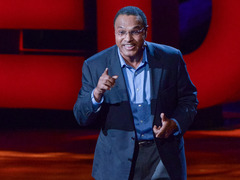 Freeman Hrabowski: 4 pillars of college success in science
Hrabowski won their blessing to march in the Children’s Crusade, a pivotal moment in the American Civil Rights Movement in 1963. He was taken to jail for participating, even though he was just 12-years-old. In today’s talk, Hrabowski shares the words that King said to him and the others inside the jailhouse: “What you children do this day will have an impact on children who have not been born.”
Freeman Hrabowski: 4 pillars of college success in science
Hrabowski won their blessing to march in the Children’s Crusade, a pivotal moment in the American Civil Rights Movement in 1963. He was taken to jail for participating, even though he was just 12-years-old. In today’s talk, Hrabowski shares the words that King said to him and the others inside the jailhouse: “What you children do this day will have an impact on children who have not been born.”
Today, Hrabowski is the president of the University of Maryland, Baltimore County (UMBC), a college that serves students of all backgrounds and that is known for supporting students of color in two areas of study where they are severely underrepresented — science and engineering. The school currently leads the country in graduating African-Americans who go on complete Ph.Ds and MD/Ph.Ds in these fields.
In today’s talk, Hrabowski notes that only 20% of Black and Latino students who start out as pre-med or pre-engineering stick with these demanding majors. That said, the numbers are low in other groups, too — only 32% of white students and 42% of Asian-American students who start rigorous science and engineering majors complete them. “It’s not just minorities who don’t do well in science and engineering,” says Hrabowski. “Students in general are not making it.”
To hear Hrabowski’s four pillars for setting students up to succeed in science and engineering, watch this talk. As Hrabowski says, these guidelines were designed at UMBC to “help minorities students,” but they can also “help students in general.”
It’s been 50 years since Hrabowski went to jail for marching for equality. Much has changed since then and, yet, so any inequalities persist in the United States. Here, four more talks about heartbreaking imbalances still in play today.
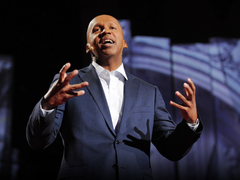 Bryan Stevenson: We need to talk about an injustice
Bryan Stevenson: We need to talk about an injustice
Bryan Stevenson: We need to talk about an injustice
Bryan Stevenson: We need to talk about an injusticeIn the eyes of the American judicial system, we are not one and the same, says public-interest lawyer Bryan Stevenson. A third of the country’s black male population has been incarcerated at some point in their lives – a statistic that should give us all pause. In this powerful talk from TED2012, Stevenson gives a rousing critique of a judicial system that “treats you much better if you’re rich and guilty than if you’re poor and innocent.” |
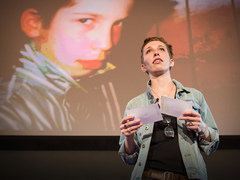 iO Tillett Wright: Fifty shades of gay
iO Tillett Wright: Fifty shades of gay
iO Tillett Wright: Fifty shades of gay
iO Tillett Wright: Fifty shades of gayPhotographer iO Tillett Wright has been in love with men, and she’s been in love with women. Though marriage was far from her mind in 2008, when California’s Proposition 8 sparked a national debate over gay marriage, the conversation still struck her like a punch. She embarked on a fascinating photo project to document the LGBTQ spectrum and the many, many different shades that exist along it. |
 Aaron Huey: America's native prisoners of war
Aaron Huey: America’s native prisoners of war
Aaron Huey: America's native prisoners of war
Aaron Huey: America’s native prisoners of warPhotographer Aaron Huey headed to the Pine Ridge Indian Reservation in South Dakota to record images of people living in poverty. There, a shocking 90% of residents live below the poverty line and life expectancy for men is just 47 years. As Huey says in his powerful TEDx Talk, the photo project soon became much more — an effort to understand the history of the native Lakota people, “a time-line of treaties made, treaties broken.” |
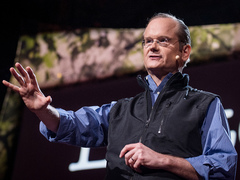 Lawrence Lessig: We the People, and the Republic we must reclaim
Larry Lessig: We the People, and the Republic we must reclaim
Lawrence Lessig: We the People, and the Republic we must reclaim
Larry Lessig: We the People, and the Republic we must reclaimIn this bold talk from TED2013, legal activist Larry Lessig addresses a central corruption at the heart of our electoral system – that in order to do well in a general election, a politician must first win the blessing of funders. And yet, this second group represents a scant 150,000 people out of 311 million. While, yes, politicians are responsible to the people, they’re also responsible to their funders—giving this small group far too much influence. |
Comments (9)
Pingback: Blog Post 4, June 10, 2020 – Bus.Ethics&Corp.Socl Rspnsblty AA
Pingback: 11 Important Things We Don’t Teach Young Women About Sex That We Really Should! – Awareness Act
Pingback: It’s Not Just School, It’s Life: President Hrabowski’s TED Talk on Student Success | BreakingGround